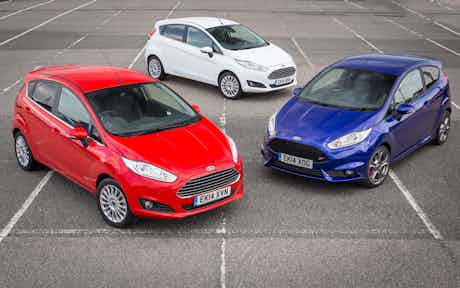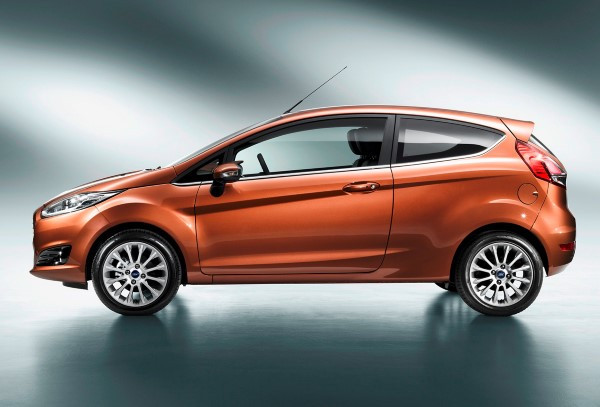Ford Fiesta Dimensions – UK Exterior and Interior Stats
June 03, 2014 by Antony Ingram

If you’re buying a new supermini like the Ford Fiesta, you need to know that it’ll suit your needs.
You might not think about it on the test drive, but that includes factors like how easy it is to park and whether it’ll fit on your driveway or in your garage. And rather than breaking out the tape measure at your local dealer, it’s probably easier if we present you all the facts and figures in one place!
Below you’ll find details on exterior and interior dimensions for the Ford Fiesta, as well as its turning circle, luggage capacity, fuel tank size and weight.
Exterior Dimensions
This is the default will it fit in my garage or on my driveway? section. Small cars are growing all the time so if you’re trading up to a Fiesta from its predecessor, or another older supermini, you may find it a little more difficult to park or squeeze on the drive.
Width (excluding door mirrors) – 1,709 mm (3dr), 1,722 (5dr)
Width (including door mirrors) – 1,978 mm
Wheelbase – 2,489 mm
Length – 3,969 mm
Height – 1,468 mm
Interior Dimensions
The benefit of larger exterior dimensions is that fitting a group of people in a car like the Fiesta has become much easier in recent years. The Fiesta isn’t the biggest in its class – you might want to look at the Renault Clio or Kia Rio for a little extra space – but it’s airy enough up front.
Front Headroom – 993 mm (mm with sunroof)
Rear Headroom – 945 mm
Front Legroom – 1,072 mm
Rear Legroom – 792 mm
Luggage capacity
The Ford Fiesta’s boot space depends on whether you specify a spare wheel or just go for the puncture repair kit option. We’d be tempted to go down the spare route – you only lose 14 litres of space (whether the rear seats are up or folded), which isn’t really enough to notice. And having a proper spare can be quite useful…
Boot space (with rear seats up) – 276 – 290 litres
Boot space (with rear seats down) – 960 – 974 litres
Turning Circle fuel tank capacity
A 10.1 metre turning circle isn’t too bad – it’s less than a Clio, ever so slightly less than a VW Polo and the same as a Vauxhall Corsa. The fuel tank is par for the class too, and means you won’t be filling up too often on the more economical models.
Turning Circle – 10,100 mm
Fuel tank – 42 litres (petrol), 40.5 litres (diesel)
Weight
The Fiesta isn’t the lightest supermini around these days, but a kerb weight of just over a metric tonne isn’t too bad – those 1.0-litre models can feel quite sprightly to drive. Oddly, it isn’t one of the diesels that’s heaviest, but the Ecoboost petrol with the Powershift automatic transmission.
Kerb weight – 1,045 kg (1.0 petrol 3dr) to 1,122 kg (1.0 Ecoboost Powershift 5dr)
More information
Check out our full guide to the Ford Fiesta, with reviews, photos, videos, stats and more.
We’ve also negotiated new Fiesta deals, with over 10% off RRP.




















